#little palestine: diary of a siege
Explore tagged Tumblr posts
Text






Little Palestine: Diary of a Siege (2021) فلسطيننا الصغيرة Dir. Abdallah Al-Khatib
#little palestine: diary of a siege#2020s#lebanon#filmgifs#moviegifs#fyeahmovies#userrobin#userkraina#userzaynab#userraffa#usersunny#usercande#filmedit#worldcinemaedit#ours#by natty#documentaryedit#pocedit#documentary
653 notes
·
View notes
Text

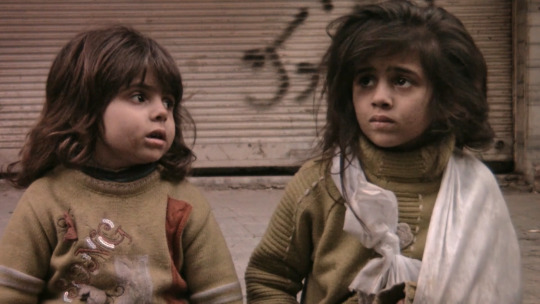



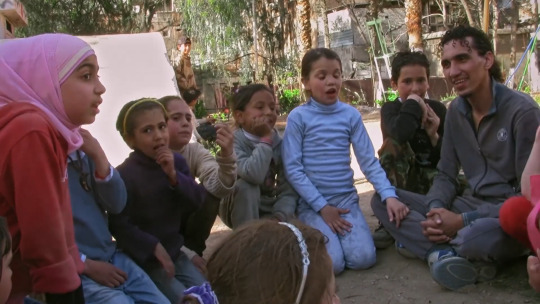
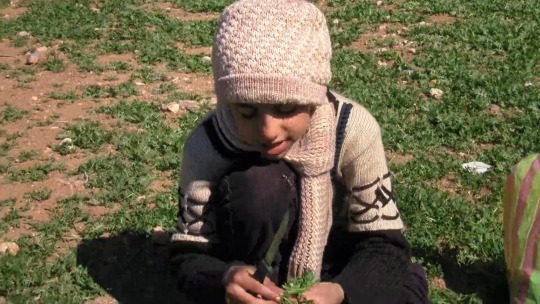
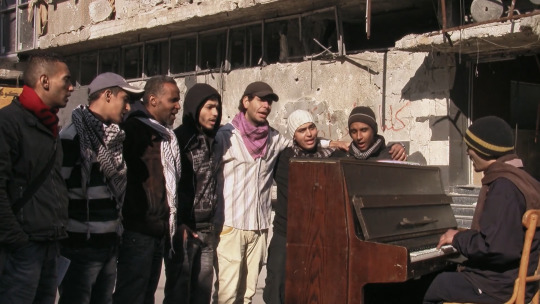


Little Palestine: Diary of a Siege (Abdallah Al-Khatib, 2021)
819 notes
·
View notes
Text
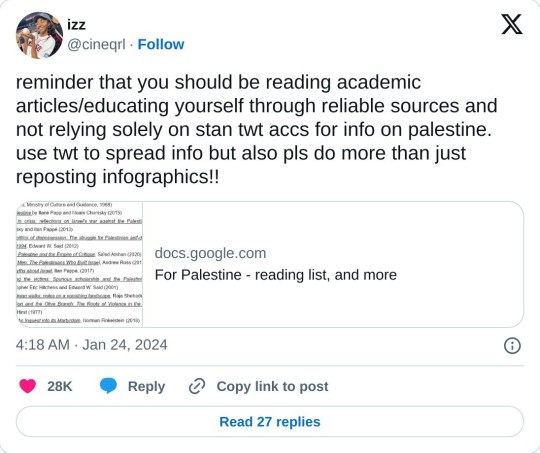
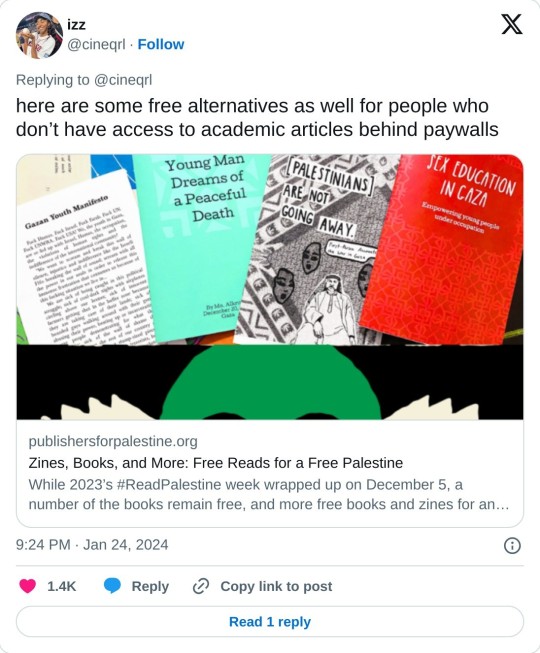
A copy of the first reading list, if you dislike clicking on Google docs links:
The liberal news media is working overtime to silence Palestinian voices. As we sit thousands of miles away, witnessing the massacre through social media, the least we can do is educate ourselves and work to educate others. Apartheid threatens all of us, and just to reiterate, anti-Zionism ≠ antisemitism.
Academic Works, Poetry and Memoirs
The Revolution of 1936-1939 in Palestine: Background, Details, and Analysis, Ghassan Kanafani (1972)
Palestinians: From Peasants to Revolutionaries, Rosemary Sayegh (1979)
Popular Resistance in Palestine: A History of Hope and Empowerment, Mazin Qumsiyeh (2011)
My Life in the PLO: The Inside Story of the Palestinian Struggle, Shafiq al-Hout and Jean Said Makdisi (2019)
My People Shall Live, Leila Khaled (1971)
Poetry of Resistance in Occupied Palestine, translated by Sulafa Hijjawi (Baghdad, Ministry of Culture and Guidance, 1968)
On Palestine by Ilan Pappé and Noam Chomsky (2015)
Gaza in Crisis: Reflections on the US-Israeli War Against the Palestinians, Noam Chomsky and Ilan Pappé (2013)
The Politics of Dispossession: The Struggle for Palestinian Self-Determination, 1969-1994, Edward W. Said (2012)
Queer Palestine and the Empire of Critique, Sa’ed Atshan (2020)
Stone Men: The Palestinians Who Built Israel, Andrew Ross (2019)
Ten Myths About Israel, Ilan Pappé (2017)
Blaming the Victims: Spurious Scholarship and the Palestinian Question, Christopher Eric Hitchens and Edward W. Said (2001)
Palestinian Walks: Notes on a Vanishing Landscape, Raja Shehadeh (2010)
The Gun and the Olive Branch: The Roots of Violence in the Middle East, David Hirst (1977)
Gaza: An Inquest into Its Martyrdom, Norman Finkelstein (2018)
Fateful Triangle: The United States, Israel and the Palestinians, Noam Chomsky (1983)
Israel and Palestine: Reappraisals, Revisions, Refutations, Avi Shlaim (2010)
Politicide: Ariel Sharon’s War Against the Palestinians, Baruch Kimmerling (2006)
The Holocaust Industry: Reflections on the Exploitation of Jewish Suffering, Norman G. Finkelstein (2015)
Light in Gaza: Writings Born of Fire, Jehad Abusalim (2022)
Nakba: Palestine, 1948, and the Claims of Memory, Ahmad H. Sa’di and Lila Abu-Lughod (2007)
Peace and its discontents: Essays on Palestine in the Middle East peace process, Edward W. Said (2012)
Three Poems by Yahya Hassan
Articles, Papers & Essays
“Palestinian history doesn’t start with the Nakba” by PYM (May, 2023)
“What the Uprising Means,” Salim Tamari (1988)
“The Palestinians’ inalienable right to resist,” Louis Allday (2021)
“Liberating a Palestinian Novel from Israeli Prison,” Danya Al-Saleh and Samar Al-Saleh (2023)
Women, War, and Peace: Reflections from the Intifada, Nahla Abdo (2002)
“A Place Without a Door” and “Uncle Give me a Cigarette”—Two Essays by Palestinian Political Prisoner, Walid Daqqah (2023)
“Live Like a Porcupine, Fight Like a Flea,” A Translation of an Article by Basel Al-Araj
Films & Video Essays
Fedayin: Georges Abdallah’s Fight (2021)
Naila and the Uprising (2017)
Off Frame AKA Revolution Until Victory (2015)
Tell Your Tale Little Bird (1993)
The Time That Remains (2009)
“The Present” (short film) (2020)
“How Palestinians were expelled from their homes”
Louis Theroux: The Ultra Zionists (2011)
Born in Gaza (2014)
5 Broken Cameras (2011)
Little Palestine: Diary of a Siege (2021)
Al-Nakba: The Palestinian catastrophe - Episode 1 | Featured Documentary
Organisations to donate to
Palestine Red Crescent Society - https://www.palestinercs.org/en
Anera - https://support.anera.org/a/palestine-emergency
Palestinian American Medical Association - https://palestinian-ama.networkforgood.com/projects/206145-gaza-medical-supplies-oct-2023
You First Gaza - https://donate.gazayoufirst.org/
MAP - Medical Aid for Palestinians - https://www.map.org.uk/donate/donate
United Nations Relief and Works Agency - https://donate.unrwa.org/-landing-page/en_EN
Palestine Children’s Relief Fund - https://www.pcrf.net/
Doctors Without Borders - https://www.doctorswithoutborders.org/what-we-do/where-we-work/palestine
AP Fact Check
https://apnews.com/article/israel-hamas-gaza-misinformation-fact-check-e58f9ab8696309305c3ea2bfb269258e
This list is not exhaustive in any way, and is a summary of various sources on the Internet. Please engage with more ethical, unbiased sources, including Decolonize Palestine and this list compiled by the Palestinian Youth Movement.
390 notes
·
View notes
Text
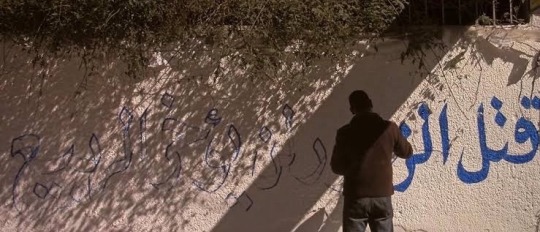
“Killing the flowers will not delay spring.”
(Al-Yarmouk Palestinian refugee camp in Damascus, Syria)
LITTLE PALESTINE, DIARY OF A SIEGE (2021) DIR. ABDALLAH AL-KHATIB
#poets corner#poet#poetry#vintage#nature#diary#life#poetic#love#dark academia#dark acadamia quotes#dark academic aesthetic#free palestine#unfeignedwriter#arabic#writers of tumblr
490 notes
·
View notes
Text
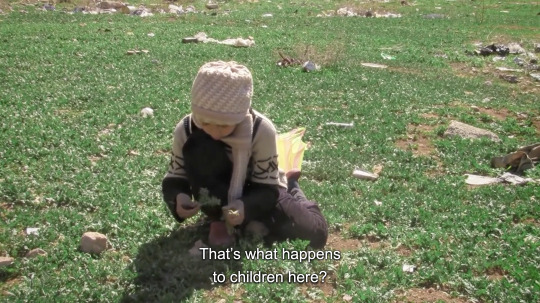
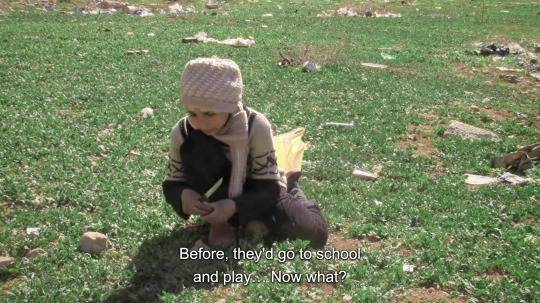
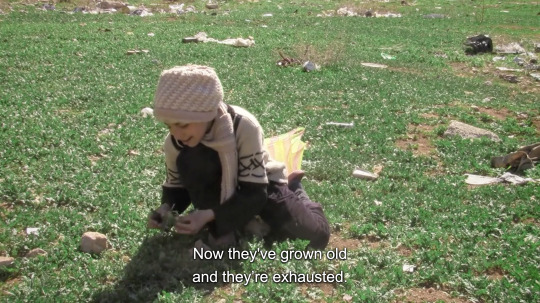
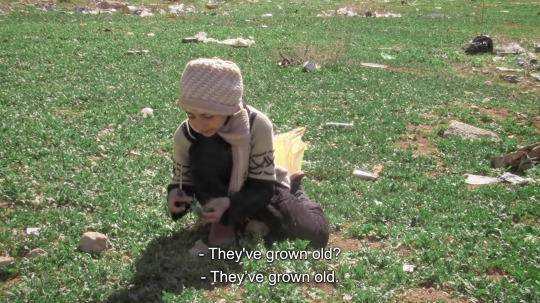
Tasnim: We're tired, but what can we do? Children toil until they're exhausted these days. They're exhausted. Some children collect firewood for warmth, some children forage for food. Abdallah: That's what happens to children here? Before, they'd go to school and play... Now what? Tasnim: Now they've grown old and they're exhausted. Abdallah: They've grown old? Tasnim: They've grown old.
Little Palestine: Diary of a Siege dir Abdallah Al-Khatib (2021)
97 notes
·
View notes
Text




Little Palestine; Diary of a siege (2021) dir. Abdallah Al Khatib
5 notes
·
View notes
Text

“killing the flowers will not delay spring” / al-yarmouk palestinian refugee camp in damascus, syria
little palestine; diary of a siege (2021) dir. abdallah al-khatib
0 notes
Link
This harrowing documentary follows life among starving Palestinians in the Yarmouk camp as Syria’s civil war raged about themAbdallah Al-Khatib’s searing documentary was completed two years ago; its arrival now has an awful new significance. The film conveys the...
0 notes
Text
dear lord they’re showing clips from “little palestine, diary of a siege” claiming it’s footage from gaza
#there is literally no shortage of footage of israeli war crimes#why are you trying to erase assad’s crimes of extermination against palestinian refugees
0 notes
Text
last song: the feels by labrinth.
favorite color: right now i'm very into brown and its different shades.
currently watching: nothing, i don't have the attention span at the moment lol.
last movie: little palestine: diary of a siege (2021).
sweet/spicy/savory: sweet.
current obssessions: trying to read as many books from my tbr list as possible before the year ends.
relationship status: single.
thanks for the tag, @afloatingjay !
tagged by @hopalongfairywren (thank you !!)
Last song: good wife by mika bc i was having cq feelings
Favorite color: purple, brown, and pink
Currently watching: actively i am watching a playthrough of pokemon mystery dungeon
Last movie: the intervention (2016) it was really weird and kind of awesome until the boringass ending
sweet/spicy/savory: tbh im a big fan of all three. probably prefer savory though ?
current obsessions: dsmp. c!crimeboys. masterchef.
Relationship status: single the last time someone was into me i kept ghosting them by accident bc i was too busy playing among us
tagging @wetchickenbreast @lacystar @qjaiden and whoever wants to do it !!
111 notes
·
View notes
Photo
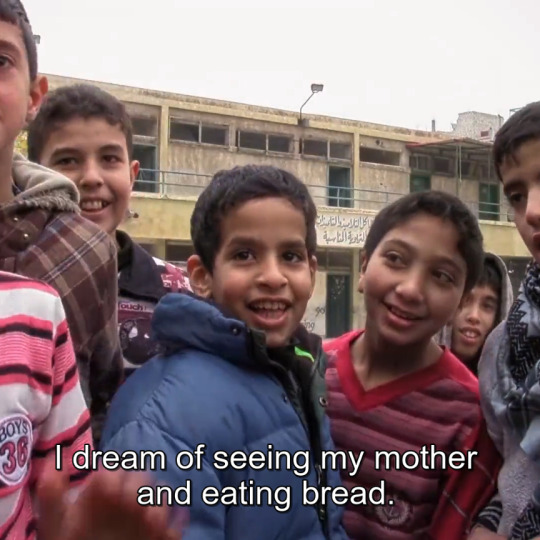
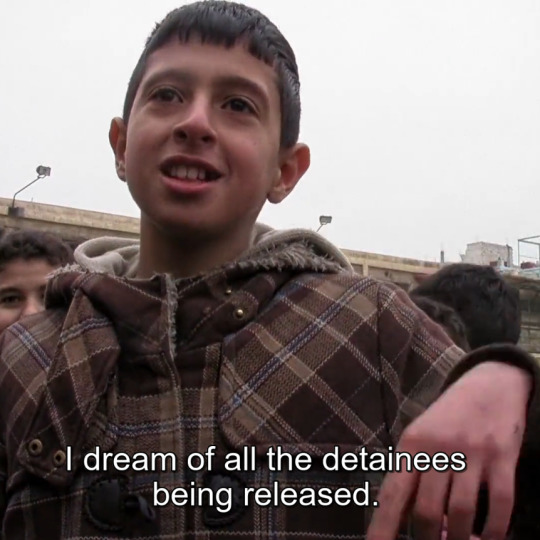


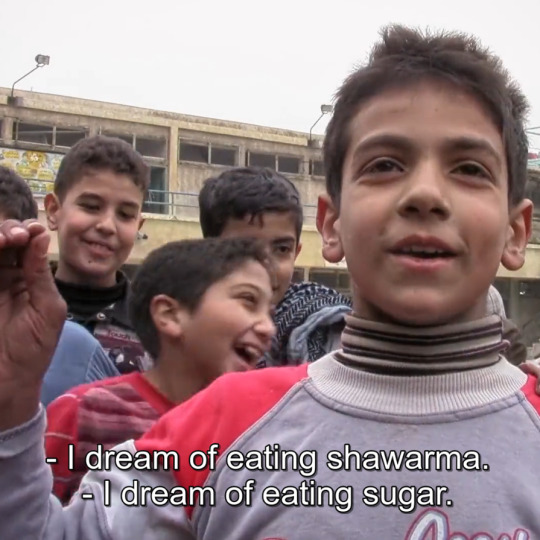

children’s dreams / al-yarmouk, palestinian refugee camp in damascus, syria
little palestine; diary of a siege (2021) dir. abdallah al khatib
65K notes
·
View notes
Text
dang, i'm just seeing this!
three ships: risa and zen from hikaeme ni itte mo, kore wa ai, coco and agott from witch hat atelier and kanda and alma from d.gray-man.
last song: martyr by sevdaliza.
last movie: little palestine: diary of a siege (2021)
currently reading: i'm reading the double: a psychoanalytic study by otto rank and her body and other parties by carmen maría machado. i'm also up to date with hotaru no yomeiri, raise wa tanin ga ii, haru no arashi to monster and zenbu kowashite jigoku de aishite.
currently watching: last show i watched was season two of vinland saga back in may, i think.
currently craving: something sweet.
thanks for tagging me, @afloatingjay !
thanks for the tag @stevethehairington and @withacapitalp!
1. Three ships
I think I’m pretty predictable when I say Steddie, but I also really like Ronance and Lumax!
2. Last song
I had to open up my Spotify for this one, since I keep a lot of low-level background music on when I’m working, but it’s “Good as It Gets” by Little Hurt.
3. Last movie
I actually just rewatched Knives Out last night because one of my friends had never seen it before, and I had to rectify that immediately.
4. Currently reading
I was reading The Dragon Republic by RF Kuang over break, but I went back to school and didn’t take the book with me. RIP. So, I started The Green Mile by Stephen King (I’ve only seen parts of the movie) and I’m really liking it so far!
5. Currently watching
I actually might be starting a rewatch of Stranger Things later today because another one of my friends has never seen it.
6. Currently craving
Sleep. No, in all seriousness, a good batch of garlic knots. But I don’t trust any pizza places in this hell state, so that’s gotta wait until spring break.
tagging (the second i start doing this, i feel like i forget every single mutual i’ve ever had): @kkpwnall @yournowheregirl @thekingandthejester @infinite-orangepeel @edmunsn @eddieunbanished and anyone else who wants to do it!
52 notes
·
View notes
Photo

Little Palestine (Diary of a Siege), Abdallah Al-Khatib (2021)
#Abdallah Al Khatib#Basel Abdullah#Majd M.A. Almassri#Yahya Diaa#Mohamad R.M. Hamid#Qusai Abu Qasem#Mouayad Zaghmout#Qutaiba Barhamji#2021
2 notes
·
View notes
Text

“killing the flowers will not delay spring” / al-yarmouk palestinian refugee camp in damascus, syria
little palestine; diary of a siege (2021) dir. abdallah al-khatib
1 note
·
View note
Photo
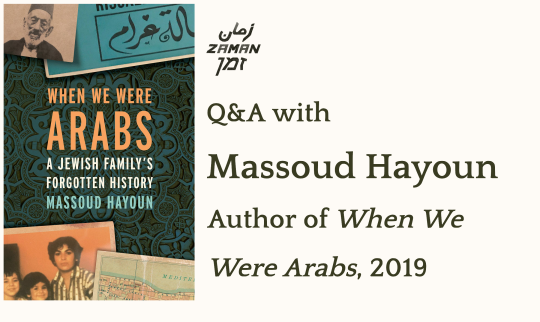
In his intriguing debut book, EPPY Award-winning nonfiction writer Massoud Hayoun tells his family’s compelling story as a means of engaging in a deeper re-evaluation of its place in a larger politicized history. As his grandparents’ lives unfold between Egypt, Tunisia, Palestine, and Los Angeles, the author reshapes existing narratives about Arabness, Jewishness, and the legacies of colonialism.

ZAMAN editors Sophie Levy and Evan Mateen contacted Massoud Hayoun to learn more about When We Were Arabs, which was released on June 25th.


ZAMAN Collective: Tell us a little about your background and who you are.

Massoud Hayoun: I’m from LA, born and raised. I went to UCLA and Columbia [University]. I’m Tunisian, Moroccan, and Egyptian-American. I am Jewish — I was raised in a faithful household and remain faithful, in a way that looks very different from that of my youth. I continue to pray, although mostly alone. I read psalms several times a week. I fast on Yom Kippur. I occasionally study Torah, also alone these days. I try to observe Shabbat and allow the restfulness of it to include watching television and using electronics that I find enhance my repose. I was raised by my grandparents, Oscar and Daida, while my mother worked very hard to support us financially. I am left-handed. I am into Beach House and Abdel Halim Hafez. I love Killing Eve, Pen15, Diary of a Chambermaid, Russian Doll, and Silence of the Lambs.

ZC: When did you first become interested in Mizrahi historical / cultural affairs?

MH: I don’t think there was a particular moment when I became interested in my family’s history and belonging to our homelands. Those things were ever-present. When my grandparents who raised me died, the need to preserve everything that came before became so much more tangible to me, because it was clear that otherwise, entire universes would have ended with them. My grandfather Oscar died when I was a teenager, and that pushed me to interrogate this belonging. And then my grandmother Daida died when I was 30, and I began to interrogate things with even greater ferocity. I am 31.

ZC: For people who don’t know too much about When We Were Arabs- Can you talk a little more about the book’s subject matter?

MH: When We Were Arabs is a decolonial memoir of my Jewish Arab grandparents — that is to say, it is a re-reading of their lives and what came before with a view to regain things that were robbed from us by various colonial projects and their enforcers.



Hayoun family photo (source)

ZC: Why did you choose this title? Why in the past tense?

MH: The fact that you ask the question “why in the past tense” means that the title was successful. You’re meant to ask whether we — the readers and me — can suffer all of the universes in this book be relegated to the past. Or are the readers and I engaged in a discourse about the future? The dedication of the book is ‘To Our Youth’ — it is forward-looking. Paired with the title, the flurry of tenses upfront is meant to raise questions. I had hoped that people would find the title to be fundamentally wrong — to feel ill-at-ease with or suffocated by it. Suffocated enough for those uncomfortable feelings to become actionable. With this title alone, I challenge the reader to drag the universe and the people I describe into the present and future. To move forward with them in mind.

ZC: Why did you decide to write a book in a pivot away from shorter-form journalistic articles? Why now?

MH: In my defense, I did write a lot of long-form articles, it’s just hard to make a living only writing a few big articles a year. I also didn’t pivot, per se. I’m still writing the same short-form journalistic articles, and I’ll keep writing them until I win the lottery, I guess. And maybe even still…

My grandma and I had something we wanted to say. We said it in a book, while my life and career continued on, pretty much as usual. I remain a journalist until now, and it gets tedious and daunting at times, but it’s still more fulfilling than other lines of work, precisely because I’ve worked for some exceptional publications that have allowed me to talk to people who are frequently disregarded. My short-form articles seek to help uplift voices — not just those of analysts and academics, but on many occasions of people who are systematically silenced.

ZC: Why write about Mizrahiut through the lens of a family story?

MH: I wouldn’t say I wrote about Mizrahiut. I say in the book specifically that I do not identify with the term Mizrahi, to be clear. I also never say that others from my background (even from my own family) shouldn’t identify as Mizrahi, but I have clearly explained in When We Were Arabs why that term is not one that I find empowering for myself.

I am also clear that I do not speak for anyone but myself and my family. At moments, I’m also careful not to speak for my own family, where I do not feel the closeness necessary to do so. In this book, I am writing about my own very human situation, in the hopes that people — Mizrahi-identifying and otherwise — will connect with some aspect of it.

ZC: What is the relationship between your Jewishness and Arabness? Are they two separate entities that coexist or are they more intertwined?

MH: Both are important components of who I am. My Jewishness governs matters of the spirit, for me. I do also stand with Jewish Americans in practical matters, particularly at moments when our lives, dignity, and freedom are under siege. But in this life, I am Arab first and last. Many similar people, like Moroccan human rights activist Sion Assidon, whom I interviewed in the book, have described themselves as Arabs of Jewish faith. That’s accurate to my experience, as well.



Hayoun family photo (source)

ZC: How political vs how personal is this book? Is there even a sharp divide between these two qualifiers?

MH: Politics are personal — and the more people benefit from certain oppressive power structures, the less likely they are to notice (or to feel, rather) the degree to which all politics are personal. The book intertwines politics and the personal as a function of simply trying to convey lives, deaths, and their meaning accurately. You could not have understood anything at all about my family — especially not as we were in the 20th century — without understanding a great deal about world politics. I feel that’s universally true; it’s just less evident to some.

ZC: In an NPR review of When We Were Arabs, Martha Anne Toll characterizes you as a “severe critic of Zionism.” How do you feel about having this issue brought to the forefront of your work? How would you describe your relationship to Zionism?

MH: Martha Anne Toll’s characterization was accurate; I am a “severe critic of Zionism.” This issue is an important component of the work, but the project of claiming the Jewish Arab identity and preserving this lost world is paramount and must not be subsumed by this one crucial component. The beauty of Toll’s review was that she realized this was an important but not an all-consuming element of the project I undertook with When We Were Arabs.

ZC: What’s the importance of reclaiming Arabness as a Jew, especially one whose family has relatively recent, politicized history in Israel?

MH: Reclaiming that Arabness has allowed me and my family to come to terms with a lot of inconsistencies in our and our community’s concepts of self. We empowered ourselves to answer a number of long-unanswered, uncomfortable questions: Why does the word Arab incense so many people? How many of the people whom the word incenses have actually spoken with Arabs about what Arabness means, particularly in the contemporary use of the term? If they haven’t undertaken to understand Arabness, how is that term at once so detestable and yet not important enough to try to fully examine its definition by modern Arabs?

ZC: Ultimately, what do you hope that readers will gain from reading your book?

MH: I hope that readers will feel inspired to look at themselves and their understandings of certain belongings and relationships to humanity with a critical lens. Of course, I hope they look at all facets of reality with that critical lens too. There’s nothing about these times that doesn’t deserve to be turned on its head — including but not only [limited to] the Arab-Jewish divide.


When We Were Arabs is available for online order at IndieBound, Barnes&Noble, Target, and Amazon. Click here for a list of independent booksellers that also carry Hayoun’s book.
7 notes
·
View notes





